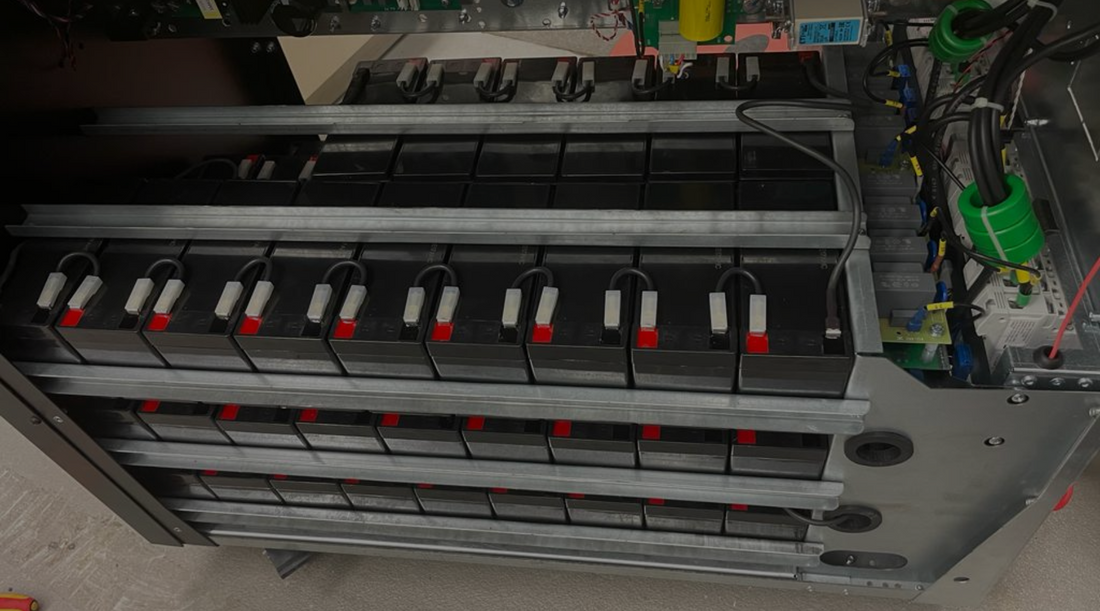Importance of understanding UPS battery life cycles
Understanding your UPS system’s battery life cycle is paramount because:
- You will be prepared for future replacements
- You can identify any unusual behaviour – and prevent unnecessary damage
- You can get the most out of each battery
In this article, we’ll tell you everything you need to know, including the main factors that impact a battery’s life cycle, ways in which you can prolong it, and tell-tale signs your battery may need replacing. Let’s get started…
Factors that affect battery life cycle
Even in optimal conditions, a battery will deplete over time. Here are some key factors that can impact the life cycle of a battery:
Environmental conditions
Keeping your UPS system and its batteries in the appropriate environment is critical. You must evaluate the following factors before getting set up:
Battery type and manufacturer
Another factor that can influence the life cycle of your batteries is the manufacturer and the battery type. Make sure that you are using the most appropriate battery type for your specific UPS system, that you invest in the finest and most well-reputed manufacturers, and that you aim to keep them stored in the optimal conditions as recommended by the manufacturer.
Quality of the UPS system
And indeed, the quality of the UPS system itself can have an impact on the overall life cycle of your batteries. As such, you must take your time to search the various UPS systems available on the market to ensure that you are investing in the right system for you, your needs, and your environment.
How to prolong battery life cycle?
So, how can you ensure that you get the most out of your UPSs batteries? Here are three things to bear in mind…
Regular maintenance
Regularly servicing and maintaining your UPS system and battery is the best way to increase its overall lifespan. This is true even for brand-new batteries.
Proper storage and handling
As mentioned above, make sure that you are installing your UPS system in the appropriate environment with the ‘ideal’ environmental conditions as stated by the manufacturer. The same applies for storing any spare batteries for future use (e.g., dry, cool, dust-free).
Monitoring battery performance
Another important thing to remember is monitoring battery performance. It’s not enough to regularly clean and maintain your system, but to carry out regular checks to determine whether it is working optimally whilst keeping an eye out for any irregularities.
When to replace the battery
And when should you replace your UPSs battery?
Signs of decreased battery performance
- Low battery indicators
- Flashing panel lights
- Peculiar control electronics notifications
- Takes longer to charge
Age of the battery
The age of the battery is also an obvious indicator as to how long you should have left before needing to replace it. Sealed lead-acid batteries tend to have a lifespan of between three and five years. If you’ve had yours installed for longer than this is a tell-tale sign that it’s time for a replacement.
Manufacturer recommendations
You should also pay close attention to the battery manufacturer’s recommendations when it comes to the overall lifespan of your battery – and indeed when it should be replaced. They will advise you on the most common age-related issues for that specific model and you can act accordingly.
FAQs
Finally, let’s address some of the most frequently asked questions regarding UPS battery life cycles…
How often should UPS batteries be replaced?
As a rule of thumb, a UPS battery should be replaced every three to five years. Naturally, this will vary depending on the battery type, the quality of the UPS system, and its environment.
How many hours will a UPS battery last?
This can vary significantly depending on a wide variety of factors (e.g., the amount of equipment you need to provide power to / the quality of your UPS).
Some high-end UPS systems can last for three to ten-hours if required, however, most UPS units are designed to provide roughly ten-minutes of power (while the main power supply is restored).
It’s always worth consulting with the experts if you wish to calculate how much power you may need / how long you would need your battery to last in the event of an emergency.
How do I know if my UPS battery needs replacing?
- You’ve had it three to five-years or more
- Alarms and display lights
- The battery life depletes quicker than advertised
- The battery itself looks swollen
- Your systems go offline during a power outage
Do UPS batteries degrade over time?
Yes, they do. Even in the most optimal environmental conditions – and even if you rarely need to rely on your UPS battery – they will degrade over time.





